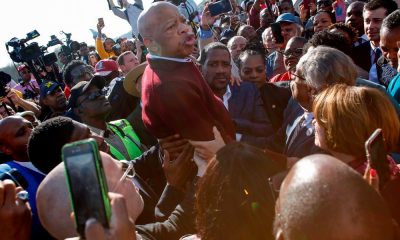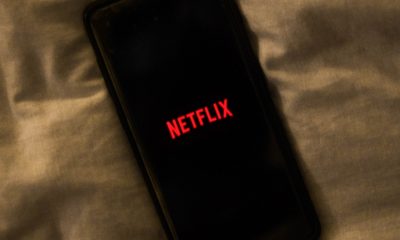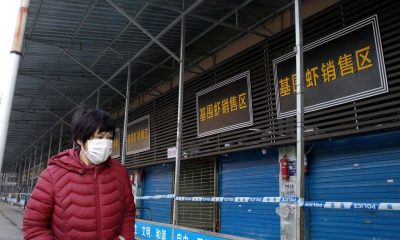World News
Tucker Carlson Praises Trump Speech That Cribbed From His Fox Show
Fox News host Tucker Carlson lavished praise Monday night on President Donald Trump’s Independence Day speech at Mount Rushmore, claiming it was “probably the single best speech” the president has ever given.The Fox News star’s love of the dark and divisive speech might not come as much of a surprise, considering that the president’s address is rooted in Carlson’s most recent monologues.Carlson, who has suddenly seen his name bandied about as a possible 2024 GOP presidential candidate amid his inflammatory commentary about the Black Lives Matter “mob,” recently cautioned the president that he might lose his bid for re-election unless he begins rounding up protesters and charging them as terrorists.Following the president’s speech, which featured warnings that “angry mobs” are tearing down “our most sacred memorials” and bringing about a “left-wing cultural revolution,” Carlson appeared much more optimistic about Trump’s electoral chances.“It was a road map for his re-election message, but more than that, it was a road map for the country itself. Equality, decency, pride in our nation. Those were the themes,” Carlson proclaimed.Noting that the president “spoke eloquently about the BLM riots,” Carlson applauded him for showing that the left “cannot control” him, saying Trump is at “his most dangerous to his enemies” when he is “telling the truth.”From there, the conservative cable news star broke down much of the president’s speech while contrasting it with what he sees as the message being delivered by presumptive Democratic presidential nominee Joe Biden and liberals. As Axios’ Jonathan Swan reported earlier, one reason Carlson may have been so smitten with the president’s culture war address is that it came directly from his own program.“Trump—or rather his speechwriter Stephen Miller—framed the president's opposition to the Black Lives Matter protest movement using the same imagery Carlson has been laying out night after night on Fox,” Swan wrote, highlighting several passages from Trump’s speech that essentially matched portions of Carlson’s monologues.Carlson has personally advised the president on several policy issues, including the coronavirus pandemic and military conflict with Iran. Indeed, in recent days, Trump has reportedly griped to associates that he shouldn’t have listened to senior adviser and son-in-law Jared Kushner, following Carlson’s criticism of Kushner’s advice to Trump.Read more at The Daily Beast.Get our top stories in your inbox every day. Sign up now!Daily Beast Membership: Beast Inside goes deeper on the stories that matter to you. Learn more.
World News
‘I Should Be Presumed Innocent.’ Hong Kong Media Tycoon Jimmy Lai Criticizes His Arrest
Hong Kong media tycoon Jimmy Lai said he was arrested on “trumped up” charges, pushing back against landmark national security legislation that has raised questions about press freedoms and the future of the democracy movement.
“They’re trumped up. I can’t go further on the details,” Lai said in an interview with Bloomberg Television on Friday morning. “Before any evidence, they just claimed and presumed that I’m guilty. This isn’t the way the law is. I should be presumed innocent. We have never supported the independence of Hong Kong.”
He said Hong Kong’s future as Asia’s main financial hub was uncertain if there was no respect for the rule of law under the new security measures.
“The future of Hong Kong is the future of any other Chinese city,” he added. “Without the rule of law, the international financial center will be finished.” He added that the law sent a “very negative” message to the business community in Hong Kong and overseas.
Lai has the highest profile of more than 20 democracy activists so far arrested under the national security law, which bars subversion, secession, terrorism and collusion with foreign powers. Hong Kong police on Monday arrested Lai along with his sons and senior executives of his media company, Next Digital Ltd., on suspicion of collusion under the security law imposed by China on June 30.
Next Digital reversed an earlier decline to rise 32% as of 9:58 a.m. It declined Wednesday and Thursday after a 1,100% gain in the first two days of this week triggered a warning from Hong Kong’s securities regulator.
The case has put new strain on already-fraught ties between the U.S. and China, with President Donald Trump calling the arrest “a terrible thing” at a Thursday briefing. The Trump administration has slapped sanctions on senior Hong Kong officials including Chief Executive Carrie Lam and has led international condemnation of the law, calling it an attempt to crush Hong Kong’s political opposition.
Reporters on Monday live-streamed a handcuffed Lai being led through the headquarters of his flagship Apple Daily newspaper. Its vocal criticism of the pro-Beijing establishment and support for last year’s historic protests helped make it a symbol of the press freedoms guaranteed to the former British colony.
“We will persist,” Lai said of the newspaper. “There’s no doubt.”
His arrest was part of an investigation into an online activist group that received more than HK$1 million ($129,000) in funding from overseas bank accounts, the South China Morning Post reported this week, citing unidentified people. Lai told Bloomberg Television that he had never given “one cent” to the protest movement and had no ties to prominent democracy activist Joshua Wong’s political party, which was disbanded as the national security law came into effect.
More Uncertainty
The arrest drew calls among opposition supporters to buy Lai’s newspapers and stock in his company, fueling a 1,100% surge in its share price and prompting the market regulator to urge investors to “exercise extreme caution.” The Securities and Futures Commission has requested brokerages’ transaction records and client information related to Next Digital’s shares, the Hong Kong Economic Journal reported Monday, citing unidentified brokers.
The law has injected an additional measure of instability to Hong Kong as a fresh challenge to businesses in Asia’s main financial hub, which was once known for predictability more than protests. The city’s economy had faltered even before the law was enacted in June, following months of often-violent rallies and turmoil fomented by Covid-19.
A survey released Thursday by the American Chamber of Commerce in Hong Kong showed almost half of businesses reported feeling pessimistic about the city’s business prospects, while others were almost equally worried about surprise retaliatory moves from the U.S.
One member company described being “caught between a rock and a hard place,” with mainland Chinese clients unwilling to work with American firms and American firms unwilling to work with companies located in Hong Kong. “Frankly impossible to do anything right now, until there is clarity,” the respondent said.
Protest Evolution
Lai said Hong Kong’s protests have been curtailed by the new security law, but that pro-democracy supporters would find new ways to continue supporting the cause.
“The protest movement has been reduced quite a lot,” he said. “A lot of young people have left or are about to leave. And some of the pro-democracy movement people have stepped aside.”
“Those that remain are still very strong. And more people are reacting to the national security law in a different way,” he said. “I think the movement will go on. I don’t know how they’re going to go on. We can no long have 2 million people walk on the street. Are people going to scatter into small groups? I think in the future there will be innovation.”
-With assistance from Natalie Lung, Kari Lindberg and David Watkins.
World News
Jared Kushner Is Working on More Middle East Pacts With Israel
With 89 days to go until the 2020 presidential election, President Donald Trump on Thursday unveiled a deal between Israel and the United Arab Emirates that marks a significant step in establishing peace in the Middle East—a promise Trump made in his first 100 days in office.Speaking with reporters Thursday, Trump joked that he wanted the pact, an agreement to normalize diplomatic relations, “to be called the Donald J. Trump accord.” National Security Adviser Robert O’Brien said it “wouldn’t surprise him” if Trump was nominated for a Nobel Peace Prize because of his role in helping broker the deal.But for all the intentional focus by the White House on the president Thursday, senior administration officials say it was Trump’s son-in-law Jared Kushner who worked behind the scenes over the last several months to smooth out the agreement and convince Prime Minister Benjamin Netanyahu and Crown Prince Mohammed Bin Zayed (MBZ) to agree to it publicly in the lead up to the 2020 election. Thursday’s announcement is an extension of a years-long effort by Kushner to construct a working Middle East Peace Plan, an accord formally announced by President Trump in January, and officials say they expect the president’s son-in-law to deliver similar agreements between Israel and other Arab nations in the next several weeks.Revealed at Last: Trump’s Israeli-Palestinian Peace Deal to End All PeaceTrump’s announcement Thursday highlights the critical role Kushner could play in delivering foreign policy wins for the president in the weeks leading up to the 2020 election. It also underscores the extent to which Kushner has cultivated his personal relationships with world leaders, including Netanyahu, to advance the Trump administration’s interests. While some national security officials have previously chided Kushner for operating outside of the traditional interagency process, some senior officials now acknowledge the importance of the president’s son-in-law continuing to use his connections to broker these deals and bolster Trump’s chances at winning in November. “There’s no way this would have gotten done without Jared,” one senior official said. As Trump’s foreign policy and national security teams work to bolster the president’s foreign policy credentials in the lead up to the election, senior administration officials, including those in the national security apparatus, say the White House is increasingly focused on introducing additional agreements between Israel and other Arab nations. One official said Kushner and other senior officials were in talks with Bahrain about a similar pact.Other national security officials who spoke to The Daily Beast said that while they view the Israel-UAE agreement as a step forward in establishing peace in the region, they are concerned about the leeway it gives Netanyahu to backpedal on one of the deal’s major points.Israel and the UAE have, among other things, signed on to establishing embassies, increasing trade, and partnering on the fight against the coronavirus. Under the agreement, Israel has also promised to temporarily suspend annexation of the West Bank. On that particular point, though, Netanyahu and MBZ on Thursday offered different statements. MBZ said on Twitter that an “agreement was reached to stop further Israeli annexation of Palestinian territories.” But Netanyahu said during a speech Thursday evening Jerusalem time that he was still “committed to annexing parts of the West Bank to Israel.” Netanyahu was criticized Thursday for seemingly flipping on an issue he’d promised to carry out during his recent campaign.Those officials also said they were wary of any Israel-UAE agreement that dealt with annexation without the input of the Palestinians. “This could just be an agreement for an agreement’s sake,” said one senior administration official. “We have to see what actually comes out of this and if both sides follow through. I’m not going say this isn’t a big deal. It is. But I’m not confident that this pact gets rolling anytime soon.”Since June, Kushner has worked closely with U.S. Ambassador to Israel David Friedman to iron out the details of the Israel-UAE deal, said two senior administration officials, particularly on the language around annexation. In Washington, Kushner also worked with the Near Eastern Affairs Desk at the State Department and with Brian Hook, the special adviser on Iran, officials said. Hook traveled to Israel in July and spoke with Netanyahu about the accord, one other senior official said.While O’Brien oversaw the U.S. outreach to the Israelis and Emiratis, the bulk of the negotiations took place between Kushner, UAE Ambassador to the U.S. Yousef Otaiba and Israel’s Ambassador to the U.S. Ron Dermer, officials said. Kushner is close with both ambassadors and has for years consulted with them in the drafting of his Middle East Peace Plan. Senior officials pointed to Otaiba’s presence at the Middle East Peace Plan unveiling in Washington in January, where Trump announced the deal alongside Netanyahu, as the first public sign that the UAE was willing to work with Jerusalem. Since then, officials said, the administration has attempted to draw in the UAE on the idea of normalizing relations with Israel—a difficult task given the peace plan’s focus on the lasting security of Israel and the Palestinians rejecting it from the beginning. Otaiba recently published an op-ed in a prominent Israeli newspaper in which he outlined the ways in which Israel and the UAE could cooperate on technology, climate change, and science. “Annex will be an unmistakable sign indicating whether Israel views matters the same way,” he said.With the announcement Thursday, Otaiba seemed to indicate that the UAE would continue to pressure Israel to adhere to its plans to suspend annexation. “The UAE will continue to remain a strong supporter of the Palestinian people–for their dignity, their rights and their own sovereign state,” Otaiba said in a statement Thursday. “They must benefit too in normalization. As we have for fifty years, we will forcefully advocate for these ends.”Read more at The Daily Beast.Get our top stories in your inbox every day. Sign up now!Daily Beast Membership: Beast Inside goes deeper on the stories that matter to you. Learn more.
World News
Israel and UAE Agree to Establish Diplomatic Ties as Part of Deal to Halt Annexation of Disputed West Bank Territory
(DUBAI, United Arab Emirates) — President Donald Trump said on Thursday that the United Arab Emirates and Israel have agreed to establish full diplomatic ties as part of a deal to halt the annexation of occupied land sought by the Palestinians for their future state.
The announcement makes the UAE the first Gulf Arab state to do so and only the third Arab nation to have active diplomatic ties to Israel.
Trump tweeted a statement from the countries, acknowledging the deal. He then told reporters in the Oval Office that it was “a truly historic moment.”
“Now that the ice has been broken I expect more Arab and Muslim countries will follow the United Arab Emirates,” he said.
The recognition grants a rare diplomatic win to Trump ahead of the November election as his efforts to see an end to the war in Afghanistan have yet to come to fruition while efforts to bring peace between Israel and the Palestinians have made no headway. Israel and the UAE also have been among Trump’s closest foreign allies.
For Israel, the announcement comes after years of boasting by Israeli Prime Minister Benjamin Netanyahu that his government enjoys closer ties to Arab nations than publicly acknowledged. Netanyahu has sought to build settlements on lands sought by the Palestinians and embraced a Trump proposal that would allow him to annex large parts of the occupied West Bank while granting Palestinians limited autonomy in other areas.
For the UAE, home to skyscraper-studded Dubai and the rolling, oil-rich sand dunes of Abu Dhabi, it further burnishes its international campaign to be seen as a beacon of tolerance in the Middle East despite being governed by autocratic rulers. It also puts the UAE out first in a regional recognition race among neighboring Gulf Arab states.
And for the Palestinians, who long have relied on Arab backing in their struggle for independence, the announcement marked both a win and setback. While Thursday’s deal halts Israeli annexation plans, the Palestinians have repeatedly urged Arab governments not to normalize relations with Israel until a peace agreement establishing an independent Palestinian state is reached.
“Israel got rewarded for not declaring openly what it’s been doing to Palestine illegally & persistently since the beginning of the occupation,” senior Palestinian official Hanan Ashrawi wrote on Twitter. She also said the UAE has come forward with its “secret dealings/normalization with Israel.”
“Please don’t do us a favor. We are nobody’s fig leaf!” she wrote.
The joint statement from the U.S., the UAE and Israel said delegations would meet in the coming weeks to sign deals on direct flights, security, telecommunications, energy, tourism and health care. The two countries also will partner on fighting the coronavirus pandemic.
“Opening direct ties between two of the Middle East’s most dynamic societies and advanced economics will transform the region by spurring economic growth, enhancing technological innovation and forging closer people-to-people relations,” said the statement by Trump, Netanyahu and Abu Dhabi Crown Prince Mohammed bin Zayed Al Nahyan, the day-to-day ruler of the UAE. It said the leaders had a three-way call discussing the deal.
U.S. Secretary of State Mike Pompeo praised the deal.
“This is a remarkable achievement for two of the world’s most forward leaning, technologically advanced states, and reflects their shared regional vision of an economically integrated region,” he said in a statement. “It also illustrates their commitment to confronting common threats, as small — but strong — nations.”
He added: “Blessed are the peacemakers. Mabruk and Mazal Tov.”
Netanyahu tweeted an Israeli flag with a short message in Hebrew: “Historic Day.”
Among Arab nations, only Egypt and Jordan have active diplomatic ties with Israel. Egypt made a peace deal with Israel in 1979, followed by Jordan in 1994. Mauritania recognized Israel in 1999, but later ended relations in 2009 over the Israel’s war in Gaza at the time.
In addition to Trump, the main U.S. mediators for agreement were the president’s senior advisor and son-in-law Jared Kushner, special Mideast envoy Avi Berkowitz and David Friedman, the U.S. ambassador to Israel.
The UAE is a U.S.-allied federation of seven sheikhdoms on the Arabian Peninsula. Formed in 1971, the country like other Arab nations at the time did not recognize Israel over its occupation of land home to the Palestinians.
“Arab oil is not dearer than Arab blood,” the UAE’s founding ruler, Sheikh Zayed bin Sultan Al Nahyan, once pronounced when agreeing to an oil boycott over U.S. military support to Israel in the 1973 Mideast war.
The UAE relied on white-collar Palestinians in creating its nation. Over time, it maintained its stance that Israel allow the creation of a Palestinian state on land it seized in the 1967 war.
But in recent years, ties between Gulf Arab nations and Israel have quietly grown, in part over their shared enmity of Iran and the Lebanese militant group Hezbollah. Prince Mohammed also shares Israel’s distrust of Islamist groups like the Muslim Brotherhood and the militant group Hamas that holds the Gaza Strip.
The UAE’s state-run WAM news agency acknowledged the deal, framing it as not just a move that helps the UAE and Israel, but one that also carries benefits for the Palestinians. Top Emirati official Anwar Gargash told reporters Thursday that the move dealt a “death blow” to moves by Israel to annex Palestinian lands.
It remains unclear what prompted Israel and the UAE to make the announcement now. In June, the United Arab Emirates’ ambassador to the U.S. warned in an Israeli newspaper op-ed that Israel’s planned annexing the Jordan Valley and other parts of the occupied West Bank would “upend” Israel’s efforts to improve ties with Arab nations.
The agreement gives Netanyahu a domestic boost at a time when Israel’s shaky coalition government is plagued by infighting and facing the possibility of early elections in the coming months. Netanyahu has seen his popularity plummet as the country grapples with a renewed coronavirus outbreak and skyrocketing unemployment as the result of earlier lockdown measures.
Netanyahu also delivered a valuable diplomatic achievement to his good friend, Trump, ahead of U.S. elections.
Still, by dropping the annexation plan Netanyahu may be hedging his bets ahead of a possible change in the White House. Joe Biden, the presumptive Democratic nominee, has made clear that he would oppose any moves by Israel to unilaterally redraw the Mideast map and annex lands sought by the Palestinians.
Netanyahu also risked criticism inside his own hard-line Likud Party, whose members strongly supported annexation. Netanyahu appears to be betting that Likud members — and the small, but influential settler movement — will agree the peace agreement delivers more benefits than unilateral annexation. Opinion polls have shown that annexation is not a high priority for the vast majority of the Israeli public.
Abandoning its annexation plan changes little on the ground. Israel already holds overall control of the West Bank and continues to expand its settlements there, while granting the Palestinians autonomy in a series of disconnected enclaves. Some 500,000 Israelis now live in the rapidly expanding West Bank settlements.
Next year, Israel will take part in the UAE’s delayed Expo 2020, the world’s fair being hosted by Dubai. A secret synagogue also draws practicing Jews in Dubai. The UAE also has announced plans to build the Abrahamic Family House in Abu Dhabi, which will house a mosque, a church and a synagogue.
Israelis traveling with Western passports routinely enter the UAE without a problem, though one still can’t make a phone call between the two countries. Israelis also work in Dubai’s gold and diamond trade as well.
Emirati officials also have allowed Israeli officials to visit and the Israeli national anthem was played after an athlete won gold in an Abu Dhabi judo tournament. Israel also has a small mission representing its interests at the International Renewable Energy Agency in Abu Dhabi.
___
Lee reported from Bled, Slovenia, and Federman reported from Jerusalem. Associated Press writers Aamer Madhani in Washington and Aya Batrawy in Dubai, United Arab Emirates, contributed to this report.
-
 Business4 weeks ago
Business4 weeks agoBernice King, Ava DuVernay reflect on the legacy of John Lewis
-
World News3 weeks ago
Heavy rain threatens flood-weary Japan, Korean Peninsula
-
 Technology3 weeks ago
Technology3 weeks agoEverything New On Netflix This Weekend: July 25, 2020
-
Finance3 months ago
Will Equal Weighted Index Funds Outperform Their Benchmark Indexes?
-
Marketing Strategies7 months ago
Top 20 Workers’ Compensation Law Blogs & Websites To Follow in 2020
-
 World News7 months ago
World News7 months agoThe West Blames the Wuhan Coronavirus on China’s Love of Eating Wild Animals. The Truth Is More Complex
-
Economy10 months ago
Newsletter: Jobs, Consumers and Wages
-
 Finance8 months ago
Finance8 months ago$95 Grocery Budget + Weekly Menu Plan for 8

